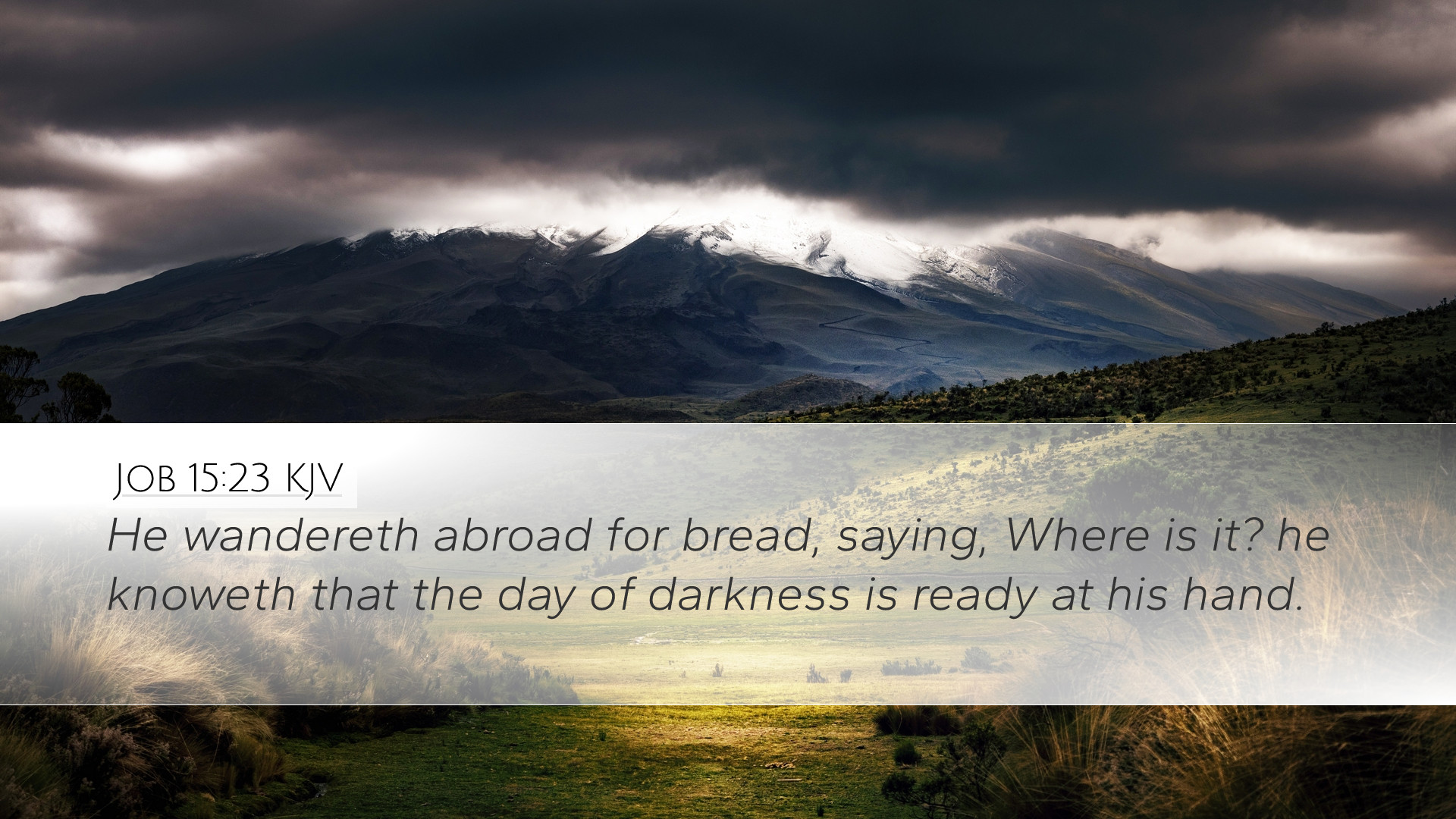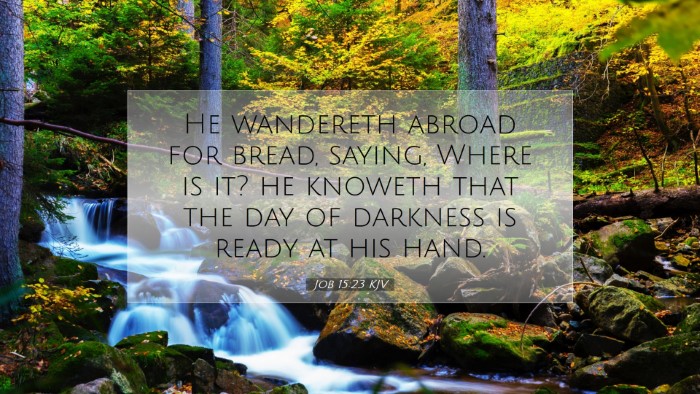Commentary on Job 15:23
Verse Reference: Job 15:23 - "He wanders out for food, saying, ‘Where is it?’ He knows that the day of darkness is at hand."
Introduction
The verse in question encapsulates a profound moment in the dialogue between Job and his friend Eliphaz. It presents themes of desperation, hopelessness, and the human quest for sustenance amidst suffering. The interpretation of this verse is layered, revealing insights about divine justice, human folly, and the futility of seeking answers outside of God's wisdom.
Contextual Overview
To fully appreciate the weight of Job 15:23, one must consider the context of the Book of Job. Job, a character of immense suffering and integrity, has been engaged in a discourse regarding the nature of suffering and the righteousness of God. Eliphaz, representing a traditional view of retributive justice, asserts that suffering is a direct consequence of sin. In this context, Job 15:23 serves as a critical moment, illustrating the despair of those who feel abandoned in their suffering.
Thematic Insights
Desperation for Sustenance
Eliphaz’s depiction of Job is that of a wanderer seeking food, highlighting a soul in distress. This image can be unpacked in several ways:
- Physical Need: The search for sustenance illustrates a base human instinct, suggesting that suffering forces individuals to confront their most immediate fears — that of survival.
- Spiritual Hunger: More profoundly, the food symbolizes a hunger for understanding and connection with the divine. The "where is it" reflects humanity's search for meaning in the midst of pain.
The Illusion of Control
In wandering for food, there's an implication of losing control over one's circumstances. Eliphaz insinuates that Job's situation derives from his own actions, portraying a sense of inevitability linked with his moral choices:
- Human Limitation: The verse encapsulates man’s inability to find sustenance without divine providence. The repeated questioning underscores a profound existential crisis.
- Divine Sovereignty: Eliphaz indirectly reminds Job of God's ultimate authority over every situation, suggesting that searching for sustenance apart from God is futile.
Commentary Perspectives
Insights from Matthew Henry
Matthew Henry highlights the desperation in Eliphaz's remarks, emphasizing that the search for food symbolizes a deeper search for hope and comfort in trials. He notes that the phrase "the day of darkness" signifies impending judgment or despair, portraying a grim outlook when one is distant from divine revelation. Henry posits that, in spiritual terms, the “day of darkness” can be interpreted as a period absent of God’s favor.
Insights from Albert Barnes
Albert Barnes offers a view focusing on the idea of seeking food. He discusses the metaphor of hunger as an analogy for spiritual longing, noting that people often do not recognize when they are spiritually malnourished. Barnes interprets the "day of darkness" as a reference to those who face divine judgment, either imminently or as a broader eschatological principle.
Insights from Adam Clarke
Adam Clarke emphasizes the implications of the theme of wandering and searching. He connects it to the uncertainty felt by Job during his afflictions. Clarke argues that the very act of searching reflects a deep-seated recognition of imbalance between one's experiences and divine justice. He suggests that the “where is it?” signifies not just a search for food, but also a yearning for clarity in one's spiritual journey.
Theological Reflections
This verse invites significant theological reflections:
- Human Suffering: The desperation conveyed in Job 15:23 serves as a universal reminder that suffering can isolate individuals, making them feel as though they are wandering in the dark, seizing upon any semblance of hope.
- God's Sovereignty and Presence: Reflecting on Eliphaz's words prompts readers to contemplate the relationship between divine sovereignty and human suffering. It encourages faithful seekers to recognize that, even in turmoil, there is an underlying purpose orchestrated by God.
- Hope amid Despair: The despair evident in the verse beckons a conversation about hope. While individuals may feel lost, the Christian doctrine emphasizes that there exists a sustenance in Christ that transcends physical and spiritual hunger.
Conclusion
Job 15:23 captures a poignant moment in the exploration of fundamental human questions regarding suffering, justice, and existential need. Eliphaz’s words echo throughout history, inviting readers to examine their searches for sustenance—both physical and spiritual. For pastors, theologians, and students alike, this verse serves as a reminder of the depths of human anguish, while simultaneously illuminating the redemptive hope found in the understanding of God's presence during our darkest hours.


